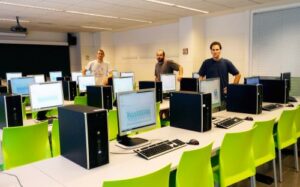MARIE for the IREC
- Dra. Nuria Garrido Soriano
- Antoni Fonseca i Casas
- Azure, C#, C++, SDLPS, SimHeuristics, Specification SDL, SQLServer
Home » Success Stories »
Description
The “Energy Performance of Buildings Directive (EPBD)”, formulated by European Directive 2010/31/EU, has as its main objective to accelerate energy saving policies in the building sector in order to achieve a 20% reduction in energy consumption in the European Union. Among other measures, Article 9 of the Directive regulates that as of December 31, 2020, new buildings must be nearly zero-energy buildings, a measure that advances to December 31, 2018, for buildings already occupied and/or owned by the public administration. With regard to this measure, the directive recommends that member states set intermediate targets in 2015 in order to gradually adopt the 2020 targets. In relation to the renovation of buildings, where the present study is framed, a series of necessary measures must be taken to ensure that the minimum requirements are met when at least 25% of the building or its envelope is renovated. The same directive explains that in order to adjust and set minimum energy efficiency requirements, methods based on the cost-benefit balance must be used to achieve cost-optimal levels of profitability.
In the Catalan context, the MARIE project, led by the Department of Territory and Sustainability of the Generalitat de Catalunya, has the general objective of defining a strategy for the improvement of energy rehabilitation, the Mediterranean building stock. One of MARIE’s objectives is the revision of Catalonia’s legislative framework, with the aim of accelerating compliance with European objectives. In the course of the MARIE project, the characterization of the current state of the different Mediterranean regions of the project and, more specifically, of Catalonia, has been developed. With this, the main barriers (legislative and structural, technical, financial, knowledge and behavioral) that are hindering the achievement of the aforementioned objectives have been detected. Similarly, the building stock in Catalonia has been characterized and the overall impact of different scenarios of action (Potential Impact Evaluation) has been analyzed.
In this context, this study aims to provide the necessary tools to the administration to be able to establish the minimum criteria for energy rehabilitation, ensuring optimal levels from an energy and economic point of view and proposing solutions adapted to the particular characteristics of Catalonia (climate and construction).
The general objective of the project is to carry out a technical study on the optimization of the energy rehabilitation of housing in Catalonia. The results will make it possible to use the knowledge gained to propose minimum requirements for the energy efficiency of dwellings and to evaluate how to gradually achieve nearly zero energy buildings (NZEB).


